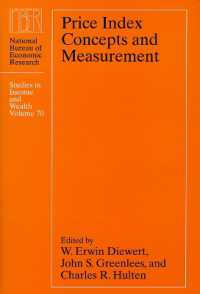- ホーム
- > 洋書
- > 英文書
- > Politics / International Relations
Full Description
As competition among the traditional great powers in the Asia region intensifies, Canada faces a stark choice: Should it align its foreign policy with the US-led free and open Indo-Pacific strategy? Shared values and material ties give Canada a clear incentive to follow the lead of the United States and Western-aligned democracies in the region. However, there are other considerations to take into account.
Follow the Leader presents the case for the development of a foreign policy based on understanding how Asia sees itself rather than Western presumptions. Examining a range of key issues, it draws on Asian scholarship, leadership statements, polling, and media to demonstrate Western misunderstanding of regional developments and to outline alternative, regionally based perspectives on Asia's contemporary dynamics.
This critical analysis urges the Canadian government to chart an independent policy, arguing that whatever Canada might gain from following its traditional allies, it equally stands to lose by aligning itself with a consortium of states committed to self-preservation over regional stability.
Contents
Introduction: Framing a Canadian Strategy in the Asia-Pacific
1 The Basics: A Critical Examination of Western Narratives on Asia
2 Asian Counter-Narratives: Indo-Pacific, Rules-Based Order, and Freedom and Openness
3 Asian Counter-Narratives: Western State Identity in the Asia-Pacific
4 Asian Narratives on Asia's Security Order: Western Hegemony as a Source of Instability
5 Chinese Counter-Narratives: The Chinese Communist Party, Hong Kong, Xinjiang, and Foreign Affairs
6 Mapping a Canadian Policy Approach to Asia: National Interests, Asian Narratives, and Network Analysis
Conclusion: Toward Omnidirectional Diplomacy and Strategic Integration
Notes; Selected Bibliography; Index








